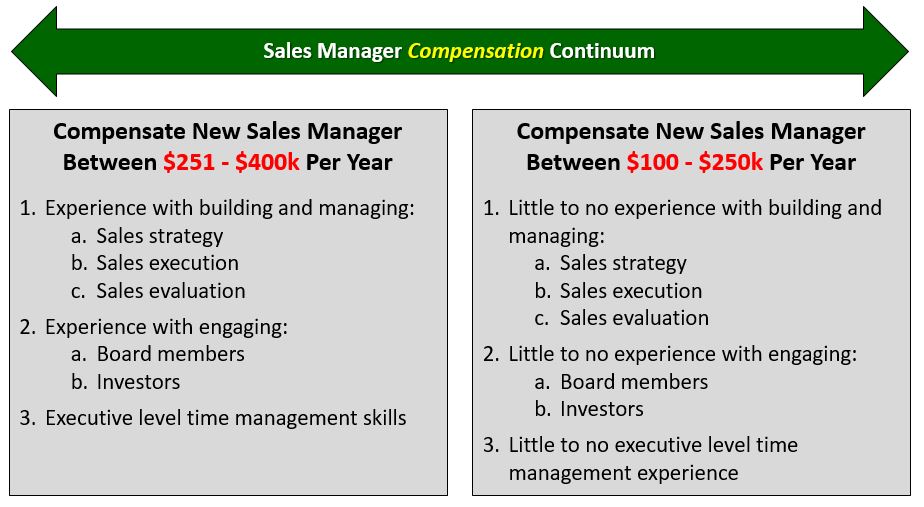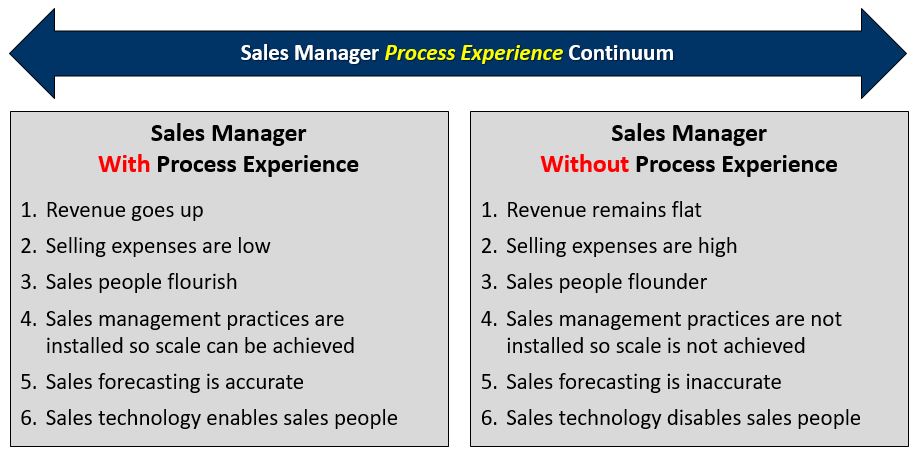How Do You Decide Whether To Hire a Sales Manager or a Chief Sales Executive?
Are you in the process of replacing your Vice President of Sales or a start-up getting ready to hire a sales manager? Many small companies that struggle with revenue growth hire the wrong level and type of sales management. Before moving forward there are four questions that you should consider:
- What do you expect them to do?
- How will you compensate them?
- What skills, knowledge, and experience do you want them to possess?
- Does your company culture support your sales management?
Let’s explore each to establish a framework to improve the odds of hiring a person that gets results.
What Do You Expect Your Sales Manager or Chief Sales Executive To Do?
More often than not, small company leaders expect to hire a sales manager that can simultaneously:
- Generate immediate sales from their “black book” of contacts.
- Hire and onboard salespeople that can immediately pay for themselves.
- Build their sales approach, sales presentations, collateral, messaging, playbook, scripts, etc.
- Craft sales strategy, accurate sales forecasts, organization structure and culture.
- Manage salespeople and daily operations i.e. coaching, evaluating, compensating and training.
- Deploy sales technology (phones, CRM, marketing automation, etc.) to enable salespeople.
- Expand into new markets, launch new products and services, and lead merger integration
Unfortunately, it’s next to impossible to find a person that has the skills, experience and time to execute all seven. Think of it this way. If you expect your sales manager to sell then hire a salesperson. If you expect you’re sales manager to manage then hire a sales manager. If you expect your sales manager to build your sales strategy and operations infrastructure then hire a Chief Sales Executive. Expecting a person to execute all six is a recipe for failure.
The consequence of hiring a person to manage all seven responsibilities is that they will either spend their time:
- Selling—which leads to short-term revenue growth but little development of the salespeople and infrastructure required to scale revenue. In this situation, the person is typically fired within 18 to 24 months.
- Building Sales Infrastructure —which leads to little or no short-term revenue and wasted time on sales infrastructure and operations research. In this situation, the person is typically fired within 6 to 12 months.
In either scenario, they will fail to develop a sales team that can build sustainable revenue growth. So, the first step is to narrowly define your expectations of sales management.

How Will You Compensate Your Sales Manager or Chief Sales Executive?
More often than not, small company leaders align sales management compensation exclusively to sales results. This causes them to focus on selling. In the short run this leads to incremental revenue growth. But The consequence is that sales management spends little if any time spent on managing and improving sales infrastructure.
manage and improve your sales infrastructure out of the goodness of their heart.
But either way your compensation plan will signal where you want them to spend their time.
Unfortunately, it’s not possible to hire a sales manager for $75K to $175K that can perform like a Chief Sales Executive paid $275K to $450K. Think of it this way. If you hire a salesperson then compensate them to sell. If you hire a sales manager then compensate them to manage salespeople. If you hire a Chief Sales Executive then compensate them to build your strategy and manage your sales infrastructure.
- Focus management incentive compensation on revenue targets i.e. selling while ignoring the other five management expectations above.
It’s problematic when you are looking for a James Bond-like revenue hero at the price of a revenue hero in training. It’s even more problematic when you are looking for your Chief Sales Executive to
- Are your compensation expectations aligned with your Chief Sales Executive expectations?
- How much of your Chief Sales Executive compensation is focused on managing and improving sales infrastructure?
The consequence of compensating a person to manage all seven responsibilities is that they will either be:
- Too expensive – which leads to offering a compensation plan that is heavily-weighted with long-term, high-risk equity incentives. This usually results in the Chie leaving the company within 12 to 18 months because their compensation expectations are not being met. Thus, negating the discussion about firing and replacing your Chief Sales Executive.
- Affordable – which commonly leads to offering a title promotion like Vice President, Senior Vice President, Executive Vice President. This creates a proud Chief Sales Executive. But unfortunately, leads to a discussion about firing and replacing your Chief Sales Executive from 12 to 18-months. Why? Because they lack the experience to simultaneously sell while managing and improving a sales infrastructure.
In either scenario, they will fail to develop a sales team that can build sustainable revenue growth. So, the second step is to align sales management compensation to a narrow set of expectations.

Does Your Chief Sales Executive Possess The Right Skills, Knowledge, and Experience?
When you are caught in a cycle of firing and replacing your Chief Sales Executive, it’s common to find that a Chief Sales Executive is expected to possess process knowledge, skills, and experience to:
- Sell to Cover His or Her Cost. This includes generating leads, scheduling appointments, qualifying buyers, demonstrating offerings, pricing and proposals, and closing deals.
- Manage Sales Execution including sales practices, people, technology, and information.
- Build Sales Strategy including forecasting, planning, organization structure, and culture.
- Evaluate Sales Results – including tracking, analyzing, reporting and improving.
- Engage with Investors – including explaining your revenue growth plan, execution, and results.
Unfortunately, there are not many James-bond revenue heroes out there that possess knowledge, skills, and experience in all five. This contributes to the discussion about firing and replacing your Chief Sales Executive.
It’s worth noting that there is no universally accepted framework for building, managing, and improving a sales team. This contributes to the discussion about firing and replacing your Chief Sales Executive.
Check out The Chief Sales Leader Framework™. It provides you with in-depth information about the three strategic and twelve operating processes that are required for sales team success. You can also check out The Chief Sales Leader Roadmap™. It provides with step-by-step instructions on how to improve your sales team.
Questions:
- What level of process knowledge, skills and experience do you expect your Chief Sales Executive to have?
- What steps are you taking to develop your Chief Sales Executives process knowledge and skills in all five areas?
- Are you providing process coaching for your Chief Sales Executive in all five areas?
In many cases, business leaders have simply not thought about this. They just want their Chief Sales Executive to sell, manage salespeople, and build out their sales team. This typically results in hiring a Chief Sales Executive that has the knowledge, skills, and experience to:
- Sell and manage sales people which causes them to struggle with managing the other processes.
- Build strategy and evaluate sales execution which causes them to struggle with managing salespeople.
In either case, firing and replacing your sales manager is more likely than revenue growth.

Does Your Company Culture Support Your Chief Sales Executive and Sales Team?
I’ve found that there are two primary culture challenges that drive the discussion about firing and replacing your Chief Sales Executive:
- Cultures that are openly condescending and hostile toward your salespeople and team. This is especially prevalent in companies with technically oriented professionals i.e. engineering, accounting, finance, medical, legal, software programming, etc..
- Many business leaders want an entrepreneurial company culture, yet want their Chief Sales Executive to run a structured, disciplined sales team.
Unfortunately, even a James Bond-like revenue hero would struggle in either or both of these company cultures. This will contribute to the discussion about firing and replacing your Chief Sales Executive.
Questions:
- Does your company culture honor and respect the sales profession or despise it?
- Do your company leaders openly look down upon and mock the sales profession or vocally support it?
- Does your company culture celebrate and reward structure, discipline, and predictability or fight it?
The situation is further complicated when Chief Sales Executives come from either a:
- Large process-minded company culture. So, they struggle in a fast-paced, ever-changing entrepreneurial environment.
- Small entrepreneurial company or start-up culture. So, they struggle to bring the structure and discipline that is required to scale a sales team.
In either case, firing and replacing your Chief Sales Executive is more likely than revenue growth.

How Do You Break The Cycle of Firing and Replacing Your Chief Sales Executive?
If you ask ten people this question odds are that you’ll receive ten unique answers. With that said, I’ve found that breaking the cycle of firing and replacing your sales manager has three operational steps:
1. Focus your sales managers time, compensation, and responsibilities on:
a. Selling to generate immediate sales from his or her own personal black book of contacts.
b. Hiring, training, and coaching salespeople.
2. Have another executive or part-time retained management consultant focus on building, managing and improving your sales:
a. Strategy, forecasting, planning, organization structure, and culture.
b. Execution procedures, management practices, technology, and information.
c. Measurement, tracking, analysis, reporting and process improvement.
d. Investor engagement to explain your revenue growth plan, execution and results.
e. Manager development into a Chief Sales Leader to manage the responsibilities above.
3. Enhance your company culture to value the sales profession by:
a. Continuously educating all employees and executives on the twelve sales processes.
b. Engaging all employees and executives in reviewing sales call recordings and/or riding along with field salespeople.
c. Publicly recognizing and celebrating your sales culture, managers, and people.
Who Is Most Qualified to Build, Manage, and Improve Your Sales Insfrastructure?
The recommendation above for breaking the cycle of firing and replacing your Chief Sales Executive can be challenging to implement. Here are some evaluation criteria to help you decide who is best equipped to help you break the cycle.
Does the executive or part-time retained management consultant:
- Have time to devote to build, manage and improve your sales infrastructure?
- Know the best practices required to execute with precision—effectively, efficiently and predictably?
- Possess the knowledge, skills, and experience to build, manage, and improve your sales infrastructure?
- Do they have a passion for building, managing, and improve your sales infrastructure?
- Do they possess the coaching skills and experience to develop your sales manager into a Chief Sales Leader?
Here’s a sample chart to help you complete this assessment:

Conclusion
There are steps that you can take to break the cycle of firing and replacing your Chief Sales Executive. The first step is to focus your Chief Sales Executive on selling and managing salespeople. The second step is to use other executives or a retained management consultant to build, manage, and improve your sales infrastructure. This will save time, money, morale, and careers by:
- Expediting short-term revenue growth.
- Relieving non-sales related pressure on your Chief Sales Executive.
- Ensuring that your sales team is using best practices.
- Developing your sales manager into a future Chief Sales Executive.
Final Thoughts About Firing and Replacing Your Chief Sales Executive
There are additional tools that you can use to break the cycle of firing and replacing your Chief Sales Executive, including:
Conducting a Chief Sales Executive Job Candidate Process Interview prior to interviewing them to:
- Pinpoint each candidates level of knowledge, skills, and experience in each sales infrastructure process.
- Provide targeted questions for business leaders to ask during interviews.
- Eliminate candidates that have limited knowledge, skills, and experience with sales infrastructure processes.
Conducting a Chief Sales Executive Assessment to help you:
- Understand your Chief Sales Executive (and business leaders) knowledge, skills, and experience with each sales infrastructure process.
- Build a sales manager development plan to enhance their skills and knowledge in each sales infrastructure process.
- Pinpoint specific sales management training needs.
Conducting a Sales Team Assessment to help you:
- Pinpoint sources of chronic under performance.
- Focus process improvement efforts within and between each sales infrastructure process.
So Please Take A Minute To:
- Write a comment on this post to let us know your expectations.
- Share this blog with other sales leaders, salespeople, CEO’s and investors.
Click Here to learn more about Chief Sales Leader™

